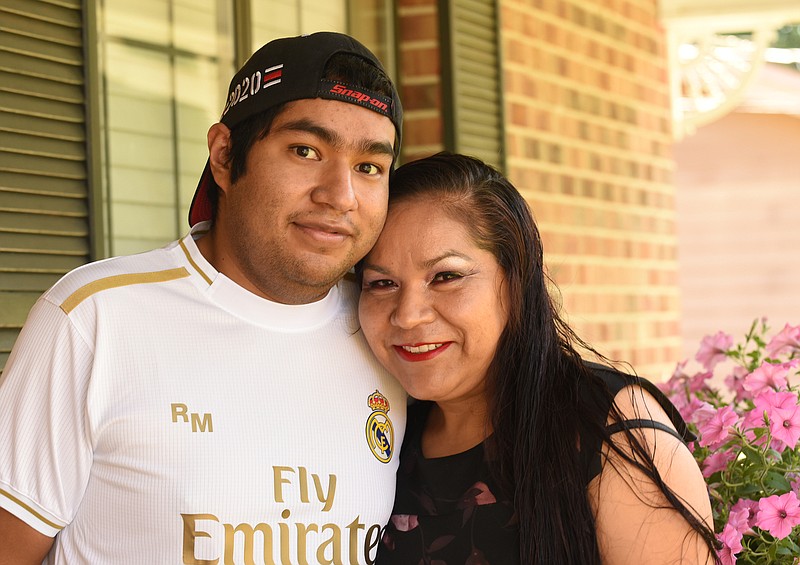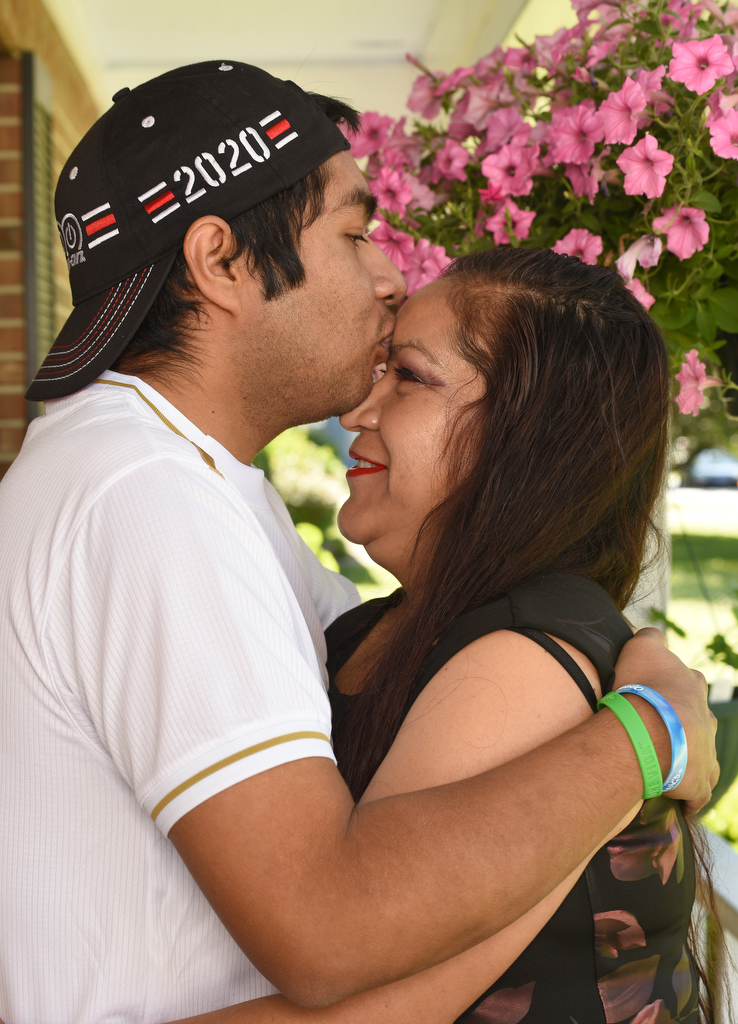Two years ago was the worst Mother's Day of Maria Castro Camacho's life. The medications that her eldest son, 24-year-old Santiago Castro Camacho, was taking to keep his kidneys functioning had stopped working, and he was forced to go on dialysis.
A kidney transplant was the best option for Santiago's long-term health, and he was placed on a waiting list for a new organ. But due to a shortage of available donors, doctors estimated it would be seven years before a kidney became available.
Maria's thoughts returned to one of her darkest childhood memories. Decades prior, 15-year-old Maria had tried to donate one of her kidneys to her brother Medardo, whose kidneys were failing. But they weren't a match, and Medardo died waiting on a kidney transplant. He was 24 years old at the time, just like Santiago.
"When doctors told them the result that my mother wasn't matched with him, it was very sad for both," Santiago said.
Maria saw firsthand through her brother Medardo what could happen to a person who had to wait too long for a new kidney, and she feared Santiago would face the same fate. So when it came time for Santiago to need a transplant, she wanted to try again to be a living organ donor.
"She would tell me, 'I want to give you the kidney. Don't worry. Everything is going to be fine,'" Santiago said. "But I was like, 'No, thank you. I prefer to wait the seven years,' because I don't want my mom undergoing this kind of surgery."
out of time
Kidney failure, also known as renal failure, occurs when the kidneys are no longer able to perform their job of filtering and cleaning blood, causing waste and toxins to accumulate in the body. The only treatments for kidney failure are dialysis, which uses a machine to perform the kidney's function of filtering blood, or transplantation.
Dr. Alan Koffron, director of transplant and hepatobiliary surgery at Erlanger Health System, said that although dialysis can treat renal failure temporarily, transplantation is always preferred. That's because about 15% of dialysis patients die due to complications each year, and dialysis can greatly limit one's quality of life. Treatment typically takes about four hours and must be performed three times per week.
"If you have to wait five years for a transplant - five times 15% - means there's a high likelihood you're not going to make it to your transplant. So, timing is very important," Koffron said. "If there's somebody that can donate a kidney and get you off dialysis and healthy again, and that's regardless of the costs of society maintaining your dialysis during those years of waiting, it's a superior form of renal replacement therapy."
But Koffron said the demand for kidneys far exceeds the supply.
"The amount of people that either donate kidneys through living donation, or when they have an adverse event and become an organ donor, has remained largely flat over time. What has changed is that the amount of people that need kidney transplants has increased, and our ability to keep people with renal failure alive longer has increased," he said. "That's why it's more important than ever for the donation to be considered, and for people to understand the increasing need for organs."
Koffron said he hopes to reinvigorate living donor transplants in the Chattanooga region in order to help meet the growing demand. Nationally, only about 20% of kidney transplants come from living donors, he said.
In addition to one kidney, living organ donors can donate a lung, or a portion of the liver, pancreas or intestine. However, kidney transplants at Erlanger are the only type of organ transplant now offered in the Chattanooga region.
A second chance
Santiago didn't know that he was sick when he was diagnosed with kidney disease about four years ago, and at first his condition didn't slow him down. He took medications and continued his active lifestyle, traveling around the U.S. and back to Mexico every six months to visit family and friends.
Around February 2019, lab work showed the effect of the medications fading and his kidneys beginning to fail. By the end of April 2019, his health had rapidly declined. Santiago remembers struggling to keep food down and his tongue turning white - signs of kidney failure.
Doctors said Santiago was a good candidate for a kidney transplant, but he would have to wait the estimated seven years for a new one or find a living donor willing to give one of their kidneys to him. Maria jumped at the opportunity to be his donor, Santiago said, but he still wasn't sure.
Santiago feared something bad would happen to his mother as a result of undergoing a voluntary surgery, which Koffron said is one common misconception that often keeps people from becoming living donors.
"The only people we allow to donate a kidney have passed a very rigorous evaluation to ensure their chance of having a complication or their life changing is virtually zero," he said.
Other common misconceptions are that only family members can be living donors and that people who donate a kidney will be left with a large scar. Koffron said anyone can potentially be a living donor, and for decades now the vast majority of living kidney donation surgeries are performed using minimally invasive laparoscopic techniques, which leaves an incision the size of "essentially three Band-Aids."
In January 2020, Santiago finally agreed to go through with the transplant, but it was derailed several times by the pandemic - first when hospitals put all non-emergency surgeries on hold and again in December 2020, when Santiago and his mother fell ill with COVID-19.
Finally, in March 2021, he went in for surgery at Erlanger.
"I was nervous. My mom, she wasn't ever nervous," Santiago said. "The first person in surgery was my mom and then me. So I was nervous. You never know what's going to happen, how the surgery might turn."
Then, 30 to 40 minutes before he went into surgery, a nurse reported that Maria was doing well in recovery.
"All the nervousness and everything that was on my mind went away. I was like, 'If my mom is OK, I'm going to be OK," he said.
Santiago got his staples out two weeks ago and is slowly getting his strength back through physical therapy, but his quality of life has already improved dramatically. He no longer has to wake up at 5:30 a.m. for his dialysis appointments. He's able to drink more liquids, and he's planning to travel again soon.
"It's a second life, but you have to take care of that life, because many people don't have this chance to make it to the kidney transplant," he said. "So the people that have that opportunity have to take care of that opportunity and say thanks to that person who gave us the second life."
Medardo didn't get that chance, which 47-year-old Maria said was the other reason besides helping her son that she wanted to donate her kidney and share her story. She did it in honor of Medardo.
"You're not only donating an organ, you're giving life to someone else," Maria said, with Santiago translating for her. "For me, it was satisfactory to see, in this case my son, having a better life. He's not going to be on dialysis anymore, and his life is going to be changed for good. Now, this Mother's Day is the best Mother's Day I could have, because we're healthy, we can celebrate. It feels like the best Mother's Day in 47 years."
Contact Elizabeth Fite at efite@timesfreepress.com.

